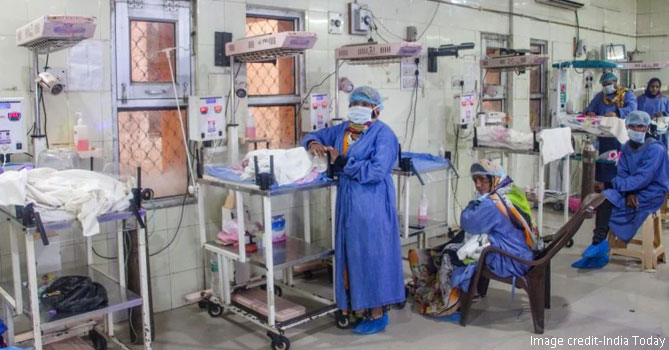
Worsening situation of child health across India is an important issue that needs to be dealt with the strictest hand. This subject is catching wildfire as infants continue to die due to lack of basic facilities in government hospitals thereby leading to higher infant deaths toll.
At present, three cities Kota (Rajasthan), Rajkot and Ahmedabad (both in Gujarat) are in the news for dubious distinction because the death toll of infants has reached 110 in Kota. At the same time, 219 children passed away in Rajkot and Ahmedabad. With this regard, the echoing silence of the state governments is deafening. With no intent and palpable actions to rescue, the state machineries are looking defunct to save the lives of children.
Clean chit to hospital staff
As news broke out of children dying in Kota, the question of India’s Infant Mortality Rate became epidemic. A three-member team of experts of the Rajasthan government had investigated the matter and did not find any negligence on the part of doctors or the hospital staff.
They made a lame-duck excuse that the hospital did not have enough beds and needed improvement.
Similar tragedy in Gujarat
Move on to Gujarat where state-run civil hospitals in Rajkot and Ahmedabad have together reported death of 219 children in December 2019. Rajkot and Ahmedabad witnessed 134 and 85 infant deaths, respectively in the last month of 2019. Gujarat Chief Minister Vijay Rupani turned speechless. When questions were asked on the death toll, he simply walked away.
No sympathy by politicians and the blame game tragedy
After the revelation of such tragic incidents in the country, political parties have spared no time in entering a blame game against each other.
When Rajasthan Chief Minister came under fire in the face of this astounding fact, he said the Congress Government has brought down the Infant Mortality Rate (IMR) in comparison to the previous BJP governance. The BJP has cited poor facilities in the government hospitals and negligence of the staff as reasons behind the deaths. In comparison to BJP’s mounting questions for the rise of the death toll in Kota, the party is pretty quiet in its home terrain in Gujarat where CM Vijay Rupani chose to walk away when asked about 134 infant deaths at Rajkot hospital. The central government team had rushed some of its experts to JK Lone and Mother Hospital in Kota to review the situation and find out the cause behind the death of more than 100 infants in the hospital.
In light of this state induced lethargy that gives such tragic ends to hundreds of families and to the lives of hundreds of children, the testimony that shines is that actual grass-root level of work and robust systems need to be implemented if any real effect is to be realised. With the bickerings, this objective is far from being met.
How to overcome the situation? What should be the solution to eliminate such incidents from occurring again in the future? These are the questions over which politicians should come together and work on.
Reduction in IMR
India has done well in reducing its infant mortality rate (IMR) by 42 per cent over the course of 12 years. As per the data released by the government on May 30, 2019, India’s IMR in 2006 was 57 per 1,000 live births while in 2017, it was reduced to 33. In spite of the improvement, India’s IMR in 2017 was much higher than the global 29.4. The IMR research shows a nation’s healthcare scenario, which speaks that India’s infant mortality rate is alarming despite improvement.
Positive steps by govt
Government has taken several steps to lessen the IMR as much as possible. Several schemes are running – Janani Suraksha Yojana (JSY) and Janani Shishu Suraksha Karyakram (JSSK). The first scheme Janani Suraksha Yojana (JSY) was launched on April 12, 2005. This scheme was implanted across the country to reduce maternal and infant mortality rate.
Janani Shishu Suraksha Karyakram (JSSK) was launched in June 2011 to remove out-of-pocket expenses for both pregnant women and sick infants. Under this scheme, all necessary care is provided to the mother and her newborn baby within 48 hours. As we know, postnatal is a critical period for the mother and her baby because chances of complications generally increase in this situation. High-quality care is essential, so the government provides free ante-natal check-ups, delivery including caesarean delivery or C-section, postnatal care and treatment of sick infants until the age of one.
UIP a ray of hope for infants
Universal Immunization Programme (UIP) has proven to be a boon for the infants. It provides free vaccinations to children against life-threatening diseases such as Tuberculosis, Diphtheria, Pertussis, Polio, Tetanus, Hepatitis B, Measles, Rubella, Pneumonia and Meningitis caused by Haemophilus Influenzae and such infrastructure has reduced the mortality rate in the country.
Pregnant women get IFA
All the pregnant women, including women suffering from anaemia, have been provided 180 iron and folic acid (IFA) tablets in the antenatal phase. Besides this, 180 IFA tablets are supplied in the postnatal period to all pregnant women. Anaemic women are also given double dose tablets as a part of the treatment.
MP records the highest IMR
Among Indian states, the highest deaths of children were recorded in Madhya Pradesh(MP) IMR-47 in 2017 followed by Assam 44 then Arunachal Pradesh 42. Delhi and Tamil Nadu have done well in reducing the infant mortality rate by 57%, i.e. from 37 in 2006 to 16 in 2017. As far as small states are concerned, Nagaland has shown a massive 65 per cent decline in IMR from 20 in 2006 to seven in 2017 while Sikkim is not behind and is catching up with Nagaland.
Government has taken several positive steps to reduce the infant mortality rate. Unfortunately, corruption and mismanagement are the significant hurdles to implement the scheme smoothly. The IMR has decreased all over the country, but lots of efforts need to be exercised to overcome this severe issue and merely politicising it isn’t going to help.





